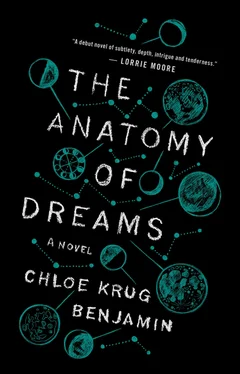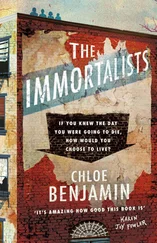It was a bare, cool day at the end of March. The smallest leaves had budded with the cautiousness of all plants born in early spring. The heat was on as I came through the door and discarded my layers. A carnation Gabe had given me for Valentine’s Day sat in a narrow vase next to the sink, its neck keeling elegantly toward the counter. I hung my sleeping-bag coat on the peg where it would sit, untouched, until I packed it haphazardly three weeks later. Gabe sat at the kitchen counter with a glass of milk. Abruptly, the heat shut off. The dust motes and down feathers that had been swirling in front of it swooped to the ground.
“You left your laptop at the lab,” I said.
A blank haze came over his eyes like a passing cloud. Then they sharpened again.
“Oh?” he asked, but his voice was too flat, his shoulders too still.
“I found something in it,” I said. “It’s a file, number one eleven. We don’t have it in hard copy—Keller must have destroyed it—and it isn’t on his computer, either. But I found it on yours. I don’t know whose it is, Gabe, but I know something’s off.”
The words spilled out of me with relief. Even as I walked to him, holding his computer in my arms, I was irrationally convinced of his innocence. I wanted to believe that Keller had uploaded the file, that Gabe had never seen it before. After all, if Keller wanted to keep something from me, there was no hiding place more brilliant than Gabe’s computer—Gabe, the person I loved, the person I was least likely to suspect. I could finally prove to him that Keller had kept secrets from us, big ones; that he didn’t trust us and we had no reason to trust him. It would be difficult for Gabe to accept, but I would help him. We could go anywhere in the country: find different jobs, spin ourselves new. I pictured us in the pocked, lunar deserts of Utah or a seaside town in Maine, eating toast with jam at a light-cast kitchen table. There would be moisture in the air. Buoyancy.
Gabe had frozen. But he did not seem to be in shock; he listened to me with the stoic commitment of someone carrying out orders. I opened the computer and double-clicked the file.
It took no more than a glance at the form for me to realize what it was. I had seen hundreds of them before. Now my heart began to knock against my ribs. I should have looked at the file by myself at the lab. How had I not looked at it?
“Did you know about this?” I asked.
“Sylvie,” said Gabe. His hands found their way to my shoulders. “Let me explain.”
The words on the page were startlingly clear. Weren’t they supposed to blur, change form and run away from me, at a time like this? Outside the kitchen window, there was a scrabble of feet and a rush of air. A clump of blackbirds rose from a tree and scattered like pebbles.
My shoulders shifted beneath his hands—the small, barely perceptible movement of an animal readying to strike.
“Read it to me,” I said.
Gabe removed his hands.
“Sylvie.”
“Read it.”
He sat down beside me and took the laptop in his hands. Ordinary noises were amplified: the dull creak of the floorboards beneath his socks, the crack of his jaw as he opened and closed it.
“‘Patient name.’” His voice was quiet and muffled. “‘Sylvia Patterson. Female. Patient number—one eleven.’”
I had never seen him cry before, not like this. He was silent, his face rigid, each drop pooling at the side of his lower lid before beginning its own slow, meandering trajectory down his cheek.
“‘Birth date—January fifth, 1980. Referring physician—Adrian Keller. Marital status—single. Chief complaint—trouble sleeping at night. Unwanted behaviors during sleep.’”
How many times had I seen this form, filled it out myself? I knew what question came next.
“For how many months or years?” I asked. I was biting down so hard that my teeth shook.
Gabe made a barely audible noise. It sounded more like his voice cracking than a single word.
“Seven years.”
“I don’t understand. Seven?”
I still had some hope that this was a mistake, that Gabe knew nothing of what he was reading. But he held my gaze.
“Seven,” he said.
My voice came out as if dispatched by someone else.
“Typical amount of time it takes to fall asleep,” I said.
“Twenty minutes.”
“Typical number of awakenings per night?”
“None.”
“Sleepwalking episodes, and how many?”
“Yes. One to two per night.”
“Dream enactment?”
“Yes.”
“Typical time patient gets out of bed.”
“Between twelve thirty and two A.M.”
Something had lodged in my chest like a bone. I could breathe only shallowly.
“Sleep habits,” I said.
Even in the first weeks of my work with Keller, I could have uttered the list that followed on command. It measured almost a full page. It had been my job to check the applicable boxes for each participant.
“‘Patient has nightmares as an adult,’” read Gabe. “‘Patient sweats during sleep. Patient kicks or jerks arms and legs during sleep. Patient drinks alcohol during the night. Patient wakes up early in the morning, unable to return to sleep. Patient grinds teeth during sleep.’”
“I don’t do that,” I said. “I’ve never ground my teeth.”
Gabe looked at me. Then his eyes returned to the form.
“‘Patient grinds teeth during sleep,’” he said. “‘Patient walks in sleep. Patient talks in sleep.’”
His head rolled forward. He supported it with his left palm, his elbow on the table.
“Sylvie,” he said. “Please.”
I had stood. I couldn’t sit still next to him; I needed some leverage, a broader view.
“Keep going,” I said.
“‘Patient has had blackouts or periods when she is unable to remember what has happened. Patient has fallen asleep during conversations. Patient has fallen asleep in sedentary situations. Patient has had injuries as a result of sleep. Patient has had hallucinations or dreamlike images while falling asleep or waking up.’”
I knew we had come to the end of the section.
“Past sleep evaluation and treatment,” I whispered.
“‘Patient has had a previous sleep disorder evaluation. Patient has had a previous overnight sleep study. Patient has had a daytime nap study. Patient has previously been treated for a sleep disorder.’”
“Social history.”
“‘Patient shares a bed with someone,’” said Gabe. “‘Patient has a partner.’”
“That’s enough.”
It was not blood in my veins—it was something faster, hotter, and more slippery, a violent substance that gave me powers I did not normally have.
“Please, Sylvie,” he said. His voice was urgent, rising in pitch. “I’m begging you. Let me explain.”
We were a foot apart, maybe less. I waited until I could trust myself to speak steadily.
“You’ve been watching me,” I said.
He was silent. He stared at the table, his eyes wide. Two small fire ants walked across the center plank, next to the salt and pepper shakers. Then they slid into the crack between two planks and were gone.
“How would you feel if you found out I’d been watching you?” I asked.
“I would feel grateful.”
He spoke slowly, carefully, as if he had rehearsed this line before.
“For what?”
“That you loved me enough,” he said. “Enough to help me.”
“If you loved me, you wouldn’t have done this. You couldn’t have.”
He reached out for me, but I sprang away. I wrenched my right arm back and struck him, the edge of my palm colliding with the hard bridge of his nose. I heard a soft pock, and then I felt the bones loosen.
Gabe opened his mouth in pain, the lips peeling back to the gums. Like mine, his blood seemed too bright for blood, too fast; it emerged from both nostrils and streamed into his mouth like paint. He tipped his head back, so that it hung over the chair, and moaned.
Читать дальше












